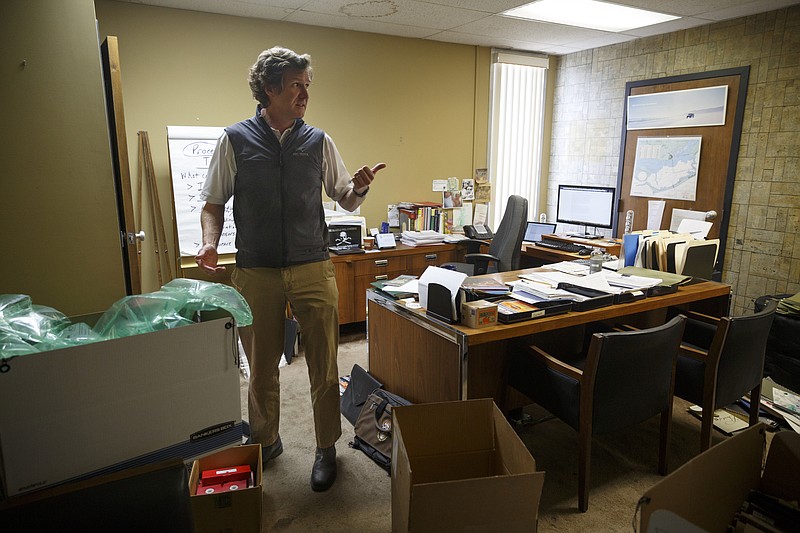Some of East Tennessee's biggest "law firms" have only a single client.
The biggest number of lawyers employed by a single business in Chattanooga is in the legal department of the Unum Group, which has about 200 attorneys handling cases around the globe.
The Tennessee Valley Authority employs 38 attorneys in its Office of General Counsel in Knoxville, while BlueCross BlueShield of Tennessee has a dozen attorneys on staff at its Chattanooga headquarters.
Chattanooga's biggest businesses rely upon both in-house and outside legal counsel to handle legal matters.
But for most smaller businesses, legal help comes from outside the company.
Chattanooga Subaru dealer Tim Kelly says his company isn't big enough to have a full-time attorney on staff so it uses an outside counsel for legal questions, disputes and contracts.
"It's more cost effective," he says, adding that the auto dealership has used an attorney at one of the big firms locally since his grandfather ran the business. "Having a long-term relationship is important."
Companies big and small in the Chattanooga area depend on lawyers who aren't on their day-to-day staffs to regularly oversee legal issues.
Mike Mallen, an attorney for the Miller & Martin law firm in Chattanooga, says some companies have large in-house legal departments while others have smaller units. Some businesses have none on staff at all.
But, in all three instances, the businesses in some way will interact with outside law firms, he says. The reason is specialization, according to Mallen.
"There are deep-in-the-weed tasks that the in-house group is not equipped to do," the attorney says. He cites such issues companies commonly face such as litigation, patent trademarks or sophisticated real estate transactions as examples.
Chris Hall, general counsel and executive vice president at Chattanooga construction company EMJ Corp., says the business will seek outside legal help if it's overwhelmed internally or there's an area or topic in which it's not familiar.
"That's on a transactional issue that doesn't involve litigation or dispute resolution," he says.
When it comes to litigation, he tries to keep that in-house to hold down costs, Hall says. But, he says, he will farm that work out when it comes to court appearances.
Cost is an issue companies consider when they decide whether or not to hire outside counsel. A Wall Street Journal report says that many companies are handling in-house work with the use of growing teams of staff attorneys not billing by the hour.
In 2014, for example, corporations shifted an estimated $1.1 billion that they used to spend on outside lawyers to their own internal legal budgets, according to a data analysis.
That was a trend that took off during the recession when general counsels were under pressure to rein in costs and companies redirected $5.8 billion in legal spending in-house.
About 58 percent of larger companies were sending more legal work to their own law departments in 2014 compared with 50 percent in 2013, according to the analysis by BTI Consulting Group Inc.
Mallen recalls that when he was in-house counsel at Southern Foundry Supply Co., he was responsible to top executives to spot certain issues and sort out legal questions and delegate those.
"In-house attorneys are delegators of tasks," he says. They farm out issues to attorneys who specialize in complex legal matters, Mallen says.
Outside firms such as Miller & Martin have to do good jobs of communicating with the business community about their strong suits and core competencies, he says.
"Good in-house lawyers should know where the strong wheelhouse lawyers are," Mallen says.
Mallen, for example, has developed skills in such fields as the Occupational Safety & Health Administration workplace safety or the environment. He says he also has a specialty in real estate, particularly involving tax-increment financing and industrial and manufacturing development and expansion.
Hall says he has a paralegal at EMJ and also someone who works with the builder on a consulting basis.
"I consider him 'of counsel' in a legal sense," he says.
Hall says that when he uses outside counsel, he feels like they're part of the team.
But, he adds, one of the advantages to keeping issues in-house is that "you're in control and the owner of it."
Even when matters are farmed outside, "I have to make sure I keep my hands on the reins," Hall says.
When he does go outside, where to go often depends on the venue of the legal matter.
"More times than not , if it's a matter in Oklahoma, we'll probably use Oklahoma counsel," he says. "What I'm looking for is the most effective use of time and money and someone else's time."

